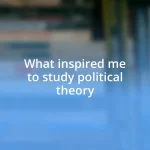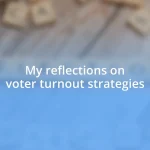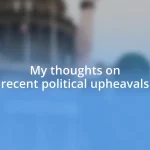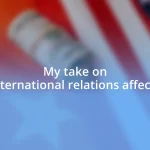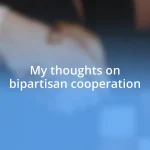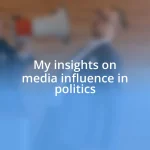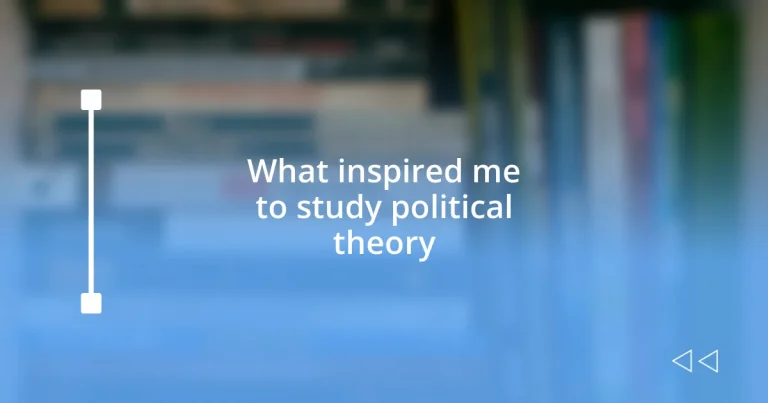Key takeaways:
- Joining a debate club in high school sparked a passion for politics and the power of discourse.
- Interning in a legislative office exposed the complexities of policymaking and deepened interest in political theory.
- Applying theories such as John Rawls’ justice and Mill’s liberty in real-world contexts highlighted the practical relevance and personal impact of political theory.
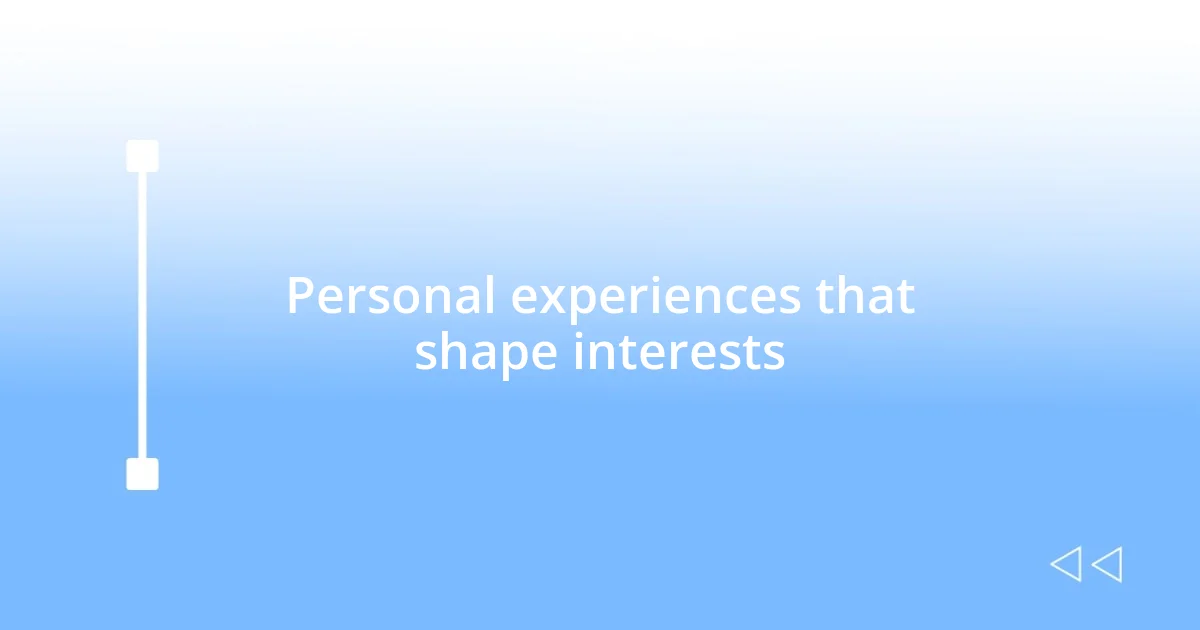
Personal experiences that shape interests
I still remember the first time I joined a debate club in high school. Standing in front of my classmates, passionately arguing about the role of government in society, I felt a rush of excitement. It was in those moments that I discovered not just my interest in politics but also the power of discourse to shape ideas and influence peers.
During my college years, I took part in a volunteer program that involved working with local communities on policy issues. Hearing the stories of individuals affected by unjust laws opened my eyes to the real-world implications of political theory. I often find myself asking, how can theoretical concepts resonate so profoundly when applied to everyday lives?
One experience that truly shaped my interest in political theory occurred during a summer internship in a legislative office. Witnessing the complexities of policymaking firsthand ignited a desire to delve deeper into the underlying philosophies. It made me ponder: What motivates lawmakers to act? This blend of personal encounters and reflective questioning profoundly deepened my passion for understanding the nuances of political systems.
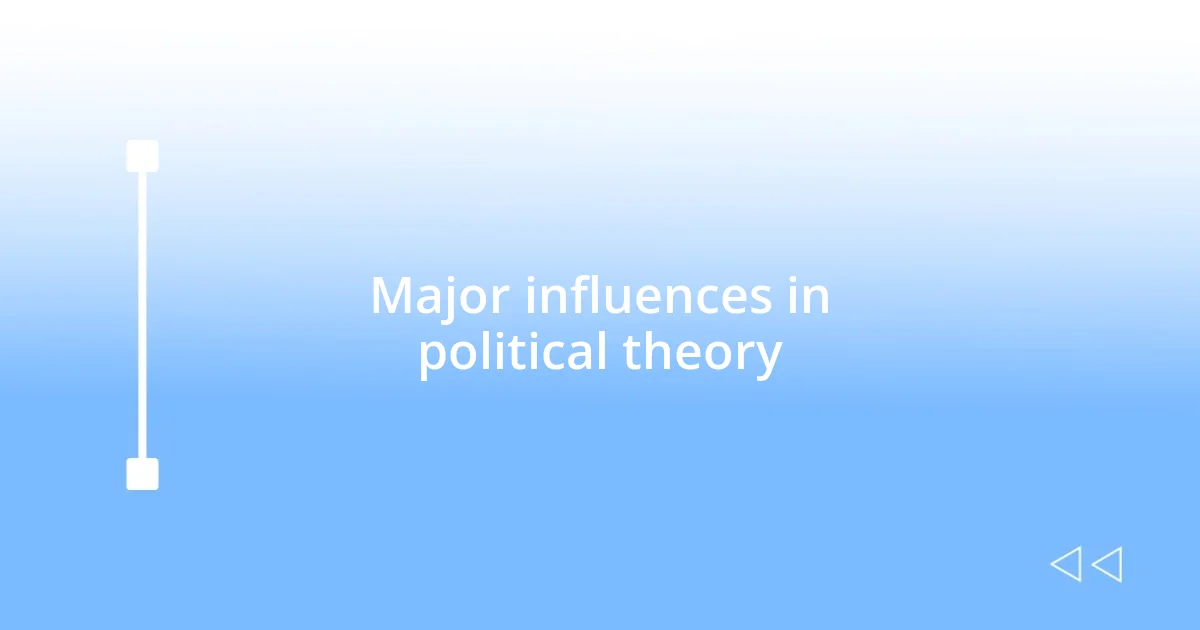
Major influences in political theory
Political theory has been shaped by various major influences throughout history, effectively weaving personal narratives with systemic analysis. One of the most compelling influences in my journey was the works of foundational thinkers like Plato and Aristotle. When I first read Plato’s The Republic, I felt transported into a dialogue where I could almost hear the debates of ancient Greece. It was fascinating to see how their discussions about justice and governance resonate even today, reflecting timeless questions about the role of the state and the individual.
Another significant influence stems from the Enlightenment, particularly the writings of Hobbes and Locke. I remember sitting in a library, surrounded by towering stacks of books, absorbing Locke’s ideas on natural rights. It was a pivotal moment for me, as these concepts helped clarify my thoughts about personal freedom and societal structure. Understanding how these philosophers grappled with the balance between liberty and authority ignited a passion within me to explore how these age-old debates continue to influence modern political landscapes.
In contemporary times, the rise of feminist political theory profoundly shaped my perspective. My initial exposure to works by theorists like Judith Butler and bell hooks during my university courses was nothing short of eye-opening. Their explorations of power dynamics and identity prompted me to reflect on my experiences within various social constructs. I often wondered about the intersection of personal identity and political structures, leading me to appreciate the depth and complexity that diverse perspectives bring to political discourse.
| Influence | Key Ideas |
|---|---|
| Plato and Aristotle | Justice, governance, the ideal state |
| Enlightenment Thinkers | Natural rights, liberty vs. authority |
| Feminist Political Theory | Power dynamics, identity, intersectionality |
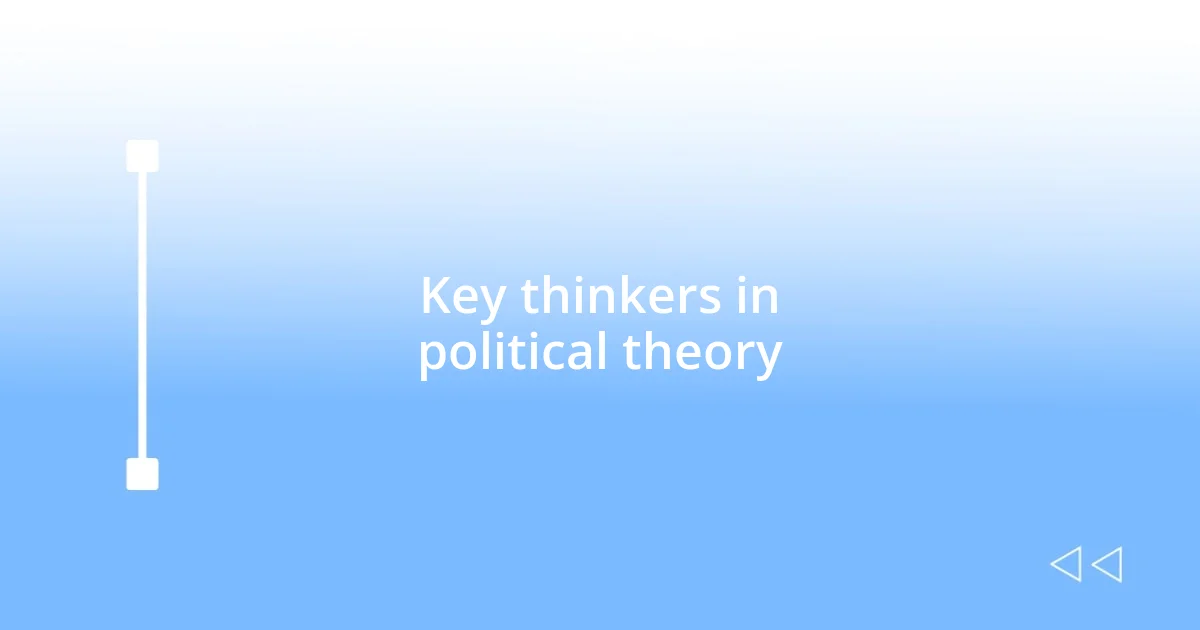
Key thinkers in political theory
Political theory is deeply enriched by the contributions of key thinkers whose ideas have shaped our understanding of society. I remember the first time I stumbled upon Machiavelli’s The Prince; its pragmatic approach to power was a revelation. It challenged my notions of morality in politics and pushed me to consider the often uncomfortable realities behind political actions. I felt a rush of intrigue as I questioned: How do we reconcile ethical values with the demands of leadership?
Another pivotal moment came when I encountered John Stuart Mill’s On Liberty. Reading his work made me realize the delicate balance between individual freedom and societal constraints. I recall sitting on a park bench, engrossed in Mill’s arguments about personal autonomy, and a sense of urgency washed over me. It was as if I had to advocate for those whose voices were silenced in the name of the greater good. This realization spurred a desire to explore the nuances of liberty in contemporary contexts.
- Machiavelli: Focused on power dynamics and pragmatic governance.
- John Stuart Mill: Explored the tension between individual freedom and social order.
- Karl Marx: Critiqued capitalism and its impact on class struggle.
- John Rawls: Introduced the concept of justice as fairness and the veil of ignorance.
Each of these thinkers has left an indelible mark on the landscape of political theory, conveying lessons that still resonate in current discussions of governance and ethics. Engaging with their works not just broadened my understanding but also ignited a burning passion to delve into the complex interplay of ideas that shape our world.
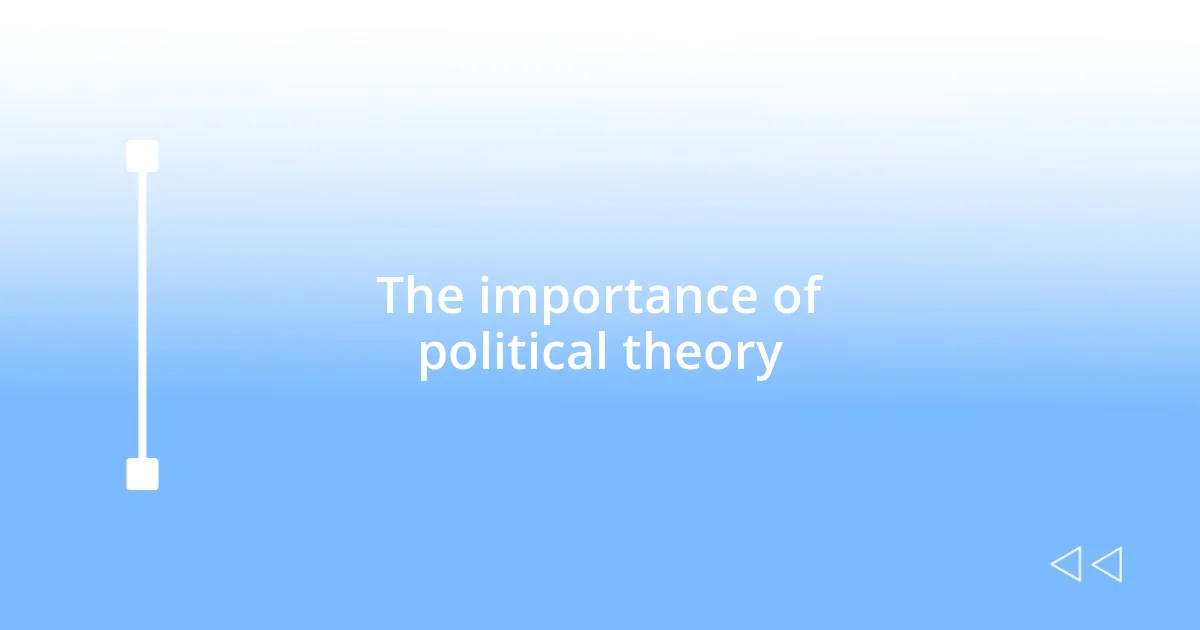
The importance of political theory
Political theory is essential because it offers us the tools to analyze and critique the structures that govern our lives. When I first started grappling with political concepts, I often found myself questioning: Why do some societies flourish while others struggle? Diving into political theory helped me uncover the answers, grounding my curiosity in historical contexts and philosophical debates. This exploration not only shaped my understanding of power dynamics but also deepened my appreciation for civic engagement.
One of the most fascinating aspects of political theory is its ability to connect past and present. I recall pondering how ancient strategies could still be seen in today’s political maneuverings. For example, Aristotle’s insights on ethics in politics resonate deeply with contemporary discussions about moral leadership. I often wonder: How is it that centuries later, we are still reexamining these fundamental issues? It ignites a passion in me to participate actively in dialogues about governance and responsibility.
Ultimately, studying political theory equips individuals with critical thinking skills necessary for meaningful participation in society. I remember attending a lecture where the professor challenged us to envision ideal governance. That moment was profound, as it sparked discussions about our responsibilities as citizens. How can we affect change if we don’t understand the frameworks of power? This realization underscores the importance of engaging with political theory: it invites us to question, reflect, and ultimately, become informed advocates for a better future.
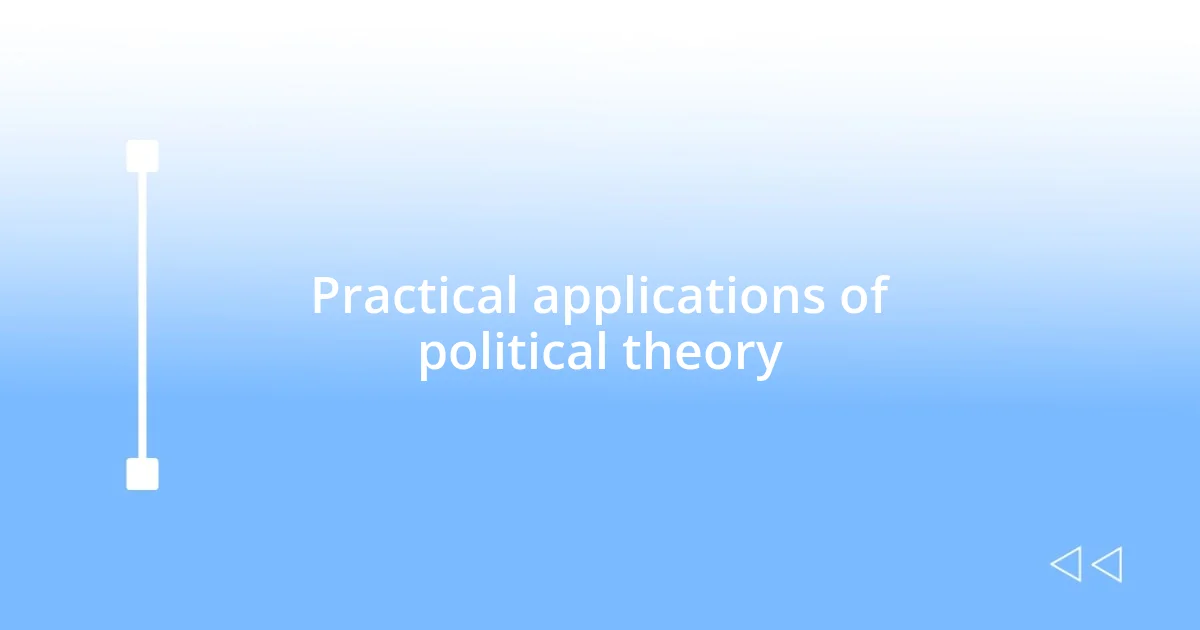
Practical applications of political theory
When I think about the practical applications of political theory, one memory stands out vividly: an internship I took at a local non-profit organization. Here, the theoretical principles I had studied suddenly became tangible as I worked on advocacy projects. The insights I gained from John Rawls about justice as fairness directly influenced our approach to promoting policies that uplift marginalized communities. I could practically feel the weight of his concepts as we structured our campaigns to reflect equity—not just in theory, but in actionable steps.
Another striking instance of applying political theory occurred during a university debate competition. We were tasked with navigating dense concepts from Marx about class struggle, and as I articulated our strategy, I felt an electric connection between theory and practice. It wasn’t merely about winning the debate; it was about genuinely understanding the power dynamics at play. I often asked myself how these theories shaped real-world issues, and debating those ideas offered me a clearer lens through which to envision solutions to contemporary challenges.
Moreover, my journey has shown me that political theory isn’t just academic—it’s personal. For instance, during community meetings, I’ve employed Mill’s ideas around individual liberty to challenge local policies that infringe upon personal freedoms. Each time I engage with these debates, I find myself reflecting: How equipped are we to assert our rights without grounding our arguments in theory? It’s a reminder that political theory is not only an intellectual exercise but a crucial tool for fostering a just society.
Challenges in studying political theory
Studying political theory isn’t without its hurdles. I remember grappling with the dense works of thinkers like Hegel, where his abstract ideas often left me confused. I would sit with my notes, overwhelmed, asking myself: What does this mean for the modern world? It’s a challenge when theories feel distant and disconnected, but pushing through that confusion ultimately led to deeper insights.
Another obstacle I encountered was the tension between theory and reality. During a seminar on political ideologies, I felt an intense push-pull as we dissected radical ideas while evaluating their applicability in today’s context. I often wondered: How do we apply the ideals of freedom and justice in the face of systemic oppression? This friction became a catalyst for my growth, prompting me to search for ways to bridge the gap between lofty theories and the gritty complexities of contemporary political landscapes.
Moreover, I’ve faced moments where I felt inadequate, especially when comparing my understanding of political theory with more seasoned peers. I vividly recall a discussion where my ideas on social contract theory seemed to falter under critical scrutiny. It sparked a realization in me: challenges like these are not just obstacles but opportunities. They encouraged me to dig deeper and reshape my understanding. How could I ensure I wasn’t merely echoing others but developing my own informed perspective? That question drove me to engage more dynamically, fostering a richer dialogue within my studies.
